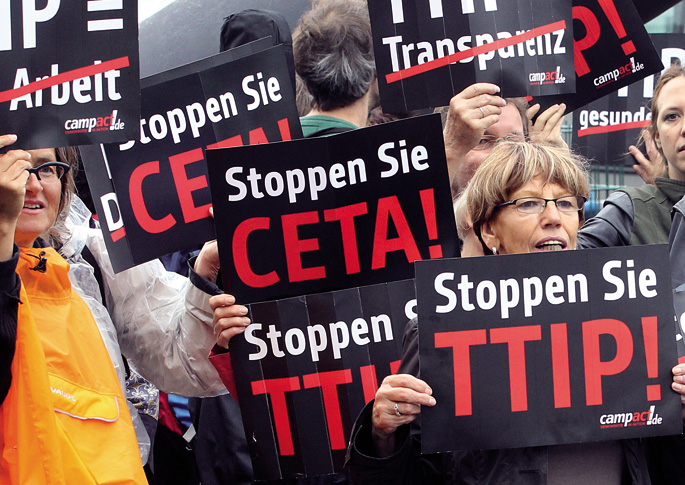CETA opens the way to the privatisation of services
- Canada has signed free trade agreements for more than twenty years and, according to Vaillancourt, in the face of public accountability, mobilisation against the Global Economic and Trade Agreement (CETA) will not be rapid. However, they are suffering from serious concrete consequences as a result of this commercial logic. The CETA would mean that public markets would open their doors to competition. There you see the shadow of evil. This agreement means the loss of the power of peoples and citizens, for the benefit of the multinationals.

Supporters of the agreement say that it will facilitate trade and that it will boost the economy in the Basque Country.
The markets between Canada and the European Union are very open; the tariffs, very low, can easily be interchangeable. Advocates of free trade face non-price barriers, that is to say, measures to protect citizens. These restrictions and/or controls are in the spotlight.
Customs is one of the few sectors with relatively high taxes. The agreement also means the end of that protection.
Customs are set up so that a people can protect their cultivation. Maleruski, the removal of these price barriers is a common practice in free trade agreements. The decision is in favour of fatter ox and pig producers. Canada foresees that they will be able to export to their agro-local industries, but it will not be easy for them, as European regimes are stricter. CETA will bring nothing good: it involves the promotion of the export-based agro-industrial industry, as well as putting obstacles in the way of small farmers who work in quality production.
In addition to the federal Government, the provinces have also participated.
With this agreement, the unions wanted to open the public markets in the Basque Country and Navarre. The federal government, the European companies will also be able to respond to the calls for tender made by the peoples and provinces of the EU. For this they needed the approval of the provinces, and they were invited to the negotiations, but, in any case, the last word is the Canadian Government.
The opening-up of public markets will not be without effect.
The opening-up of public markets is one of the most serious aspects of the CETA. Institutions often use public markets to support the economy and local development. With the CETA, however, the large competitive multinationals will be the ones that will have the most calls for tenders. The agreement means the loss of control by governments.
Small local businesses will hardly survive.
Between the small local company and the gigantic multinational it is clear who is going to get the market. This option can influence the quality of what is offered, but also investments, as local companies invest much more in the local economy. The benefits will be transferred abroad.
The principle of non-discrimination will prevent public institutions from prioritizing the same.
Public markets in excess of a certain quantity should be opened up to international competition, but ultimately the majority will be opened, this being a relatively modest amount. Under the principle of non-discrimination, priority will not be given to local employment or special environmental practices. Whoever makes the cheapest proposal will get the market.
“With the CETA, the large competitive multinationals will have the majority of calls for tenders. The agreement implies the loss of control of governments.”
The electric service is public in Quebec. Do you fear the privatisation of the sector?
The CETA will open a part of the public company Hydro-Quebec to competition, which it has also announced. This opening up of some departments of the service is a loophole, as there is a risk of multiplying the calls for tender. The agreement opens the way to the privatisation of services that could come to pieces.
The water service has been left out of the negotiations, according to the same source.
Water management is excluded from the agreement, according to the Basque Government. However, if a city decides to abandon public management and to convene an offer, it will be able to do so without any hindrance.
Companies will be able to prosecute governments for obstruction of competition.
This is called a dispute settlement mechanism between investors and States. It is very serious.
It is the most condemned aspect, particularly in Europe, but also here. The company may prosecute the Public Entity if the Public Entity is prevented from making profits. It will also serve for the expected benefits, i.e. for the benefits of carrying out a project, compensation may be required through these courts. This mechanism will allow companies to intervene in the schemes. The lobby will also be a powerful tool, as they can be threatened in drafting a law or regime.
The agreement of the American Free Trade Association (NAFTA) also allows this mechanism. It has been used on more than one occasion.
We have just given two examples. On the one hand, the US company Lone Pine Resources requires the Government of Quebec a $250 million compensation for a moratorium that prevents the exploitation of unconventional oil on the San Laurendi River. For its part, the Canadian company Transcanada is calling on the US Government $15 billion for the decision to ban the construction of the KeystoneXL pipeline. However, these two political decisions were taken democratically by a popular movement, because they were harmful to the environment.
“Under the principle of non-discrimination, local employment and specific environmental practices cannot be established. Whoever makes the cheapest proposal will get the market”
In Canada, oil exploitation is excessive and the company lobby is also impressive. It is in this area that most of the threats are concentrated.
That's right, yeah. However, we have managed to reform this mechanism and it will not normally affect environmental considerations. It is a step forward, but we are very sceptical, because behaviour can be expressed in many ways and even if the environment is a direct and concrete objective, by means of manoeuvres it can be avoided in management.
Will culture be left out of the deal?
Following the agreement for the cultural diversity of UNESCO, culture was claimed. They have, however, negotiated culture, been part of the negotiations and wanted to avoid it by chapters. There are two points of view in this practice: some say that what is due has been done and that culture is well protected, and others that are not so well protected, because this system of exclusion can be dangerous and because we have got into the game of the negotiators, without respecting the spirit of the convention.
What do you say?
I and the Attac-Quebec organization believe that culture is not protected in what it should be and that the risk is there. It had to be left out of the negotiations.
Canada is about to sign a new free trade agreement. It signed in 1994 with NAFTA, the United States and Mexico. No assessment of the agreement has been made at any time.
There has been no official assessment. We regret that Canada has embarked on a new agreement without a real, neutral and comprehensive analysis.
What is your assessment?
The expected results have not appeared. NAFTA has led to a weakening of the manufacturing sector. We are exporting natural resources, but this sector has less employment than manufacturing. In addition, it is a great economic versatility, as the exchanges of natural resources are totally changing. NAFTA has weakened us economically. It has also caused bad consequences for Mexican farmers. The export of maize in the United States has led to a massacre in agriculture. It must not be said that the mechanism for resolving discrepancies between investors and states is a serious problem.
Following the argument of the promoters, has NAFTA increased trade?
Yes, they've increased. But since 1994, the United States has become a global consumer, and despite not having signed a free trade agreement, exports to the United States have increased greatly for many countries. I therefore find it questionable to say that our exports have increased thanks to NAFTA. Canada signed an agreement to have an easier direction, but we noticed that, proportionally, we had a better direction before we signed the agreement.
How?
Because China and other exporting countries export cheap products in excessive quantities. Since we can't do this, we don't produce as much of these products anymore.
NAFTA would also have social consequences.
With NAFTA there were three reforms of unemployment insurance. Even though the government has not established any connection, I have doubts. Although the link of reason is not clear, we can say that social aid has been weakened and that we have approached the U.S. protection system. United States
What is mobilisation against the CETA?
I am very distressed, in Europe it has more family. We have difficulties in raising public awareness, we seem to give in and we accept free trade.
Was it faster in the NAFTA negotiations?
Yes, but it has been 20 years since then. At that time there was a public debate, opposition from the political parties was quicker. Today, virtually all parties are in favour or neutral. Except for Quebec Solidaire and the Green Party of Canada (PV), no one is opposed. The problem is that these two parties have few seats in Parliament.
Eurolegebiltzarrak joan den otsailean eman zion onespena Kanada eta Europar Batasunaren arteko merkataritza askeko itunari (CETA). Hitzarmena mistoa denez, erabat indarrean sartzeko EBko estatu kide guztietako parlamentuek bozkatu behar dute haren alde. Hala ere, hitzarmenaren... [+]
Ez zen ustekabekorik izan eta Europako Legebiltzarrak Kanada eta EBren arteko CETA hitzarmenaren alde bozkatu zuen otsailaren 15ean, Estrasburgon egindako saioan. 408 diputatuk eman zuten aldeko botoa, 254k aurkakoa, eta 33 abstentzio izan ziren.
Europako Legebiltzarraren gehiengoak ezetz esan dio Europar Batasunaren eta Kanadaren arteko merkataritza eta inbertsio ituna (CETA) Europako Justizia Auzitegiak azter zezala eskatzeko aurkeztutako mozioari. 258 parlamentarik bozkatu dute proposamenaren alde, eta 419k aurka... [+]
“TTIP eta CETA ezartzearren herritarrek aukeratutako parlamentu eta gobernuen aurka joko dutela frogatu du Valoniarekin gertatutakoak”, diosku Júlia Martík, Euskal Herrian TTIPari Ez! kanpainako bozeramaileetako batek. Azaroaren 5ean merkataritza askeko... [+]
Larunbatean, azaroak 5, Hego Euskal Herriko hiriburuetan TTIP eta CETA akordioen aurka mobilizatzeko deia egin dute Euskal Herriko Eskubide Sozialen Kartak eta TTIP/CETA Ez plataformak.
Valoniako Parlamentua CETAren aurka azaldu ostean, Belgikak itunari ezetz esan dio Europako merkataritza eta kanpo harremanetarako ministroen kontseiluan. Bitartean, Greenpeacek ekintza ikusgarria egin du bilkuraren kanpoko aldean.
























